Most people taking thyroid medication don’t realize that when they take it matters just as much as that they take it. If your TSH levels keep bouncing around despite taking your pill every day, the problem might not be your dose-it’s your timing and what you’re eating or drinking with it.
Why Absorption Matters More Than You Think
Levothyroxine, the synthetic version of the thyroid hormone T4, has a very narrow window where it works properly. Too little gets absorbed, and your body doesn’t get enough hormone-fatigue, weight gain, brain fog return. Too much gets absorbed, and you risk heart palpitations, anxiety, or bone loss. The difference between a perfect dose and a problematic one can be as small as 10-15% in absorption.
That’s why doctors track your TSH (thyroid-stimulating hormone) levels so closely. If your TSH jumps from 1.5 to 4.2, it’s not because your pills changed. It’s because you took it with coffee, or with your multivitamin, or right after breakfast. These aren’t minor suggestions-they’re science-backed rules that affect how your body functions.
The Gold Standard: Take It on an Empty Stomach
The most reliable way to get consistent absorption is to take levothyroxine first thing in the morning, at least 30 to 60 minutes before eating or drinking anything except water. This isn’t just a suggestion from your doctor-it’s backed by dozens of studies.
A 2009 study in the Journal of Clinical Endocrinology & Metabolism tracked 65 patients and found that when they took their pill with breakfast, their TSH levels jumped by 176% compared to when they took it on an empty stomach. That’s not a small fluctuation. That’s enough to push someone from a stable level into hypothyroid symptoms.
Why? Because food-especially high-fiber, high-fat, or high-calcium foods-binds to the medication in your gut and blocks absorption. Your stomach needs to be empty so the pill can dissolve and move quickly into the upper small intestine, where it’s absorbed best. Even milk, coffee, or orange juice can interfere. Water is the only safe drink to take with it.
What You Must Avoid for 3-4 Hours
It’s not just food. A lot of common supplements and medications can wreck your thyroid hormone absorption if taken too close together.
- Calcium supplements (including antacids like Tums): Reduce absorption by 27-36%
- Iron supplements: Cut absorption by up to 39%
- Coffee: Lowers absorption by 36%, even if taken 30 minutes after the pill
- Soy products (tofu, soy milk, edamame): Can interfere with absorption
- Proton pump inhibitors (omeprazole, lansoprazole): Change stomach pH, which affects how the pill dissolves
- Multivitamins with minerals: Often contain iron and calcium-take them at least 4 hours apart
- Fiber supplements (psyllium, methylcellulose): Bind to the medication like a sponge
If you take any of these, schedule them for dinner or bedtime-well after your morning dose. Don’t just space them out by 15 minutes. You need 3 to 4 hours. That’s not a guess. That’s what the studies show.
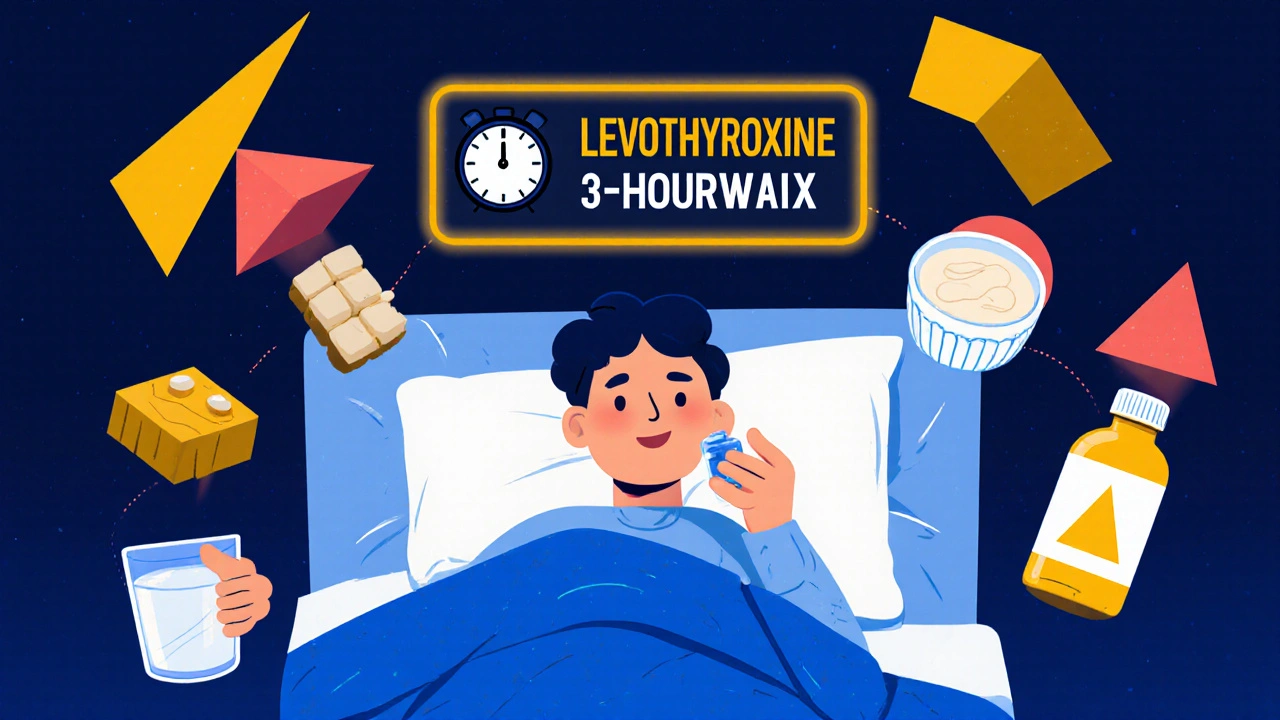
Can You Take It at Night Instead?
For years, the answer was a hard no. Morning on an empty stomach was the only approved method. But newer research is changing that.
A 2020 systematic review of 12 studies involving over 1,000 patients found that taking levothyroxine at bedtime-3-4 hours after your last meal-resulted in lower TSH levels and higher free T4 levels compared to morning dosing. Some patients even saw their TSH drop from 3.5 to 1.8 just by switching to nighttime.
Why does this work? For some people, the stomach is more empty at night. Others have busy mornings, forget to wait 30 minutes, or get nauseous taking it on an empty stomach. If you’re one of them, bedtime dosing can be a game-changer.
But here’s the catch: You need to be consistent. If you take it at 10 p.m. one night and 1 a.m. the next, your levels will swing. And you can’t eat anything after taking it-not even a snack. No late-night yogurt, no bedtime tea. Just the pill and water, then wait.
Studies like the one from Rajput et al. in 2017 found no significant difference in TSH levels between morning and evening dosing in patients who stuck to a routine. So if your morning routine is chaotic, night might be better. Just talk to your doctor first. Don’t switch without monitoring your TSH 6-8 weeks later.
Who Should Stick to Morning Dosing
Not everyone can switch to nighttime. Some groups need the strictest rules.
- Pregnant women: Thyroid hormone is critical for fetal brain development. The American Thyroid Association says morning dosing with a 30-60 minute fast is mandatory. TSH should stay below 2.5 in the first trimester.
- Thyroid cancer patients: These patients need TSH suppressed below 0.1 mIU/L. Even small absorption changes can affect treatment. Stick to the morning routine.
- Elderly patients on multiple meds: Many take calcium or iron supplements. If they can’t space them 4 hours apart, morning dosing with careful scheduling is safer.
If you’re in one of these groups, don’t try to switch unless your endocrinologist approves it. The risks outweigh the convenience.
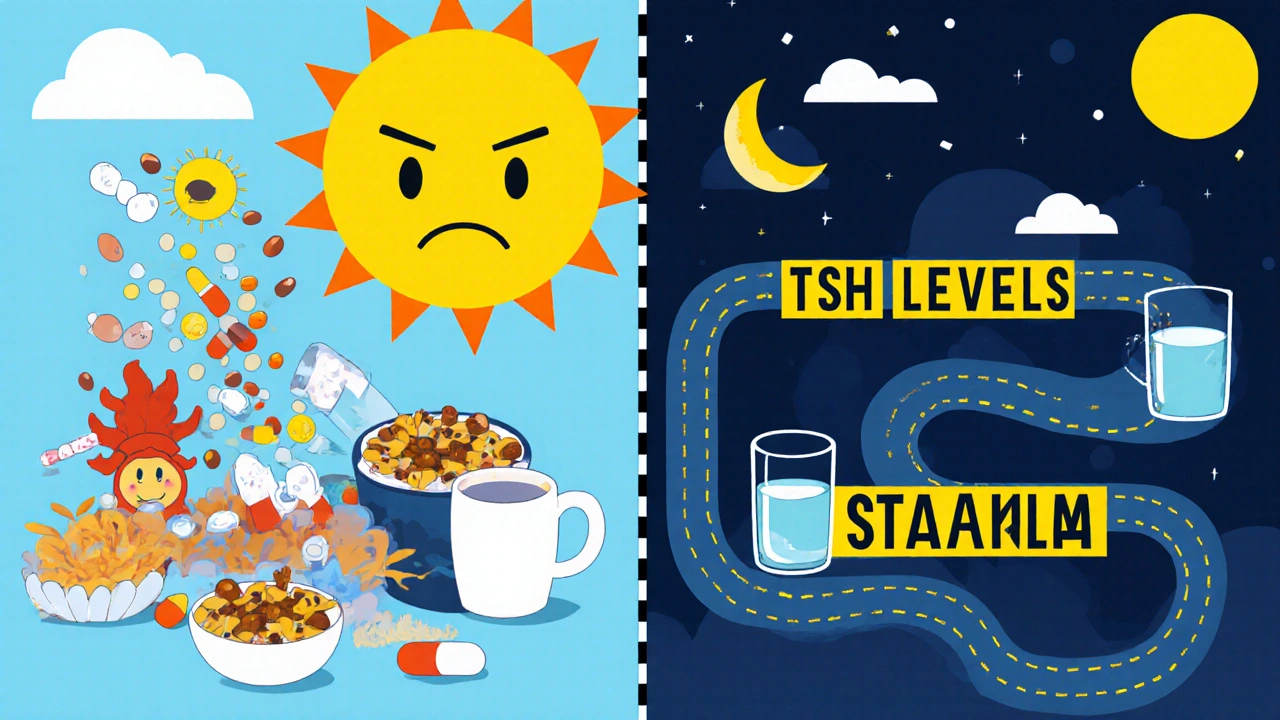
Real People, Real Problems
Online forums are full of stories about what happens when timing goes wrong.
One Reddit user wrote: “I took my pill with coffee for two weeks. My TSH jumped from 1.8 to 4.3. I felt like I was dragging through mud. I didn’t even realize it was the coffee.”
Another shared: “I switched to bedtime dosing after 10 years of bad mornings. My TSH went from 3.1 to 1.2 and stayed there. I have energy again. I wish I’d done this sooner.”
And then there’s the 57% of patients surveyed by the American Autoimmune Related Diseases Association who admitted they’d tried taking levothyroxine with breakfast-and 33% said they didn’t notice any difference. That’s dangerous. You might not feel worse right away, but your body is getting less hormone. Over time, that adds up.
How to Make It Stick
Consistency is everything. Here’s how to build a routine that works:
- Place your pill bottle next to your toothbrush or keys. If you see it every morning, you won’t forget.
- Use a pill organizer with morning and night compartments. Mark your levothyroxine clearly.
- Turn the bottle upside down after taking your pill. It’s a visual cue that you’ve done it.
- Set a phone alarm labeled “Levothyroxine - DO NOT EAT.” Studies show reminders boost adherence by 38%.
- Track your doses in a journal or app. Note if you ate early, drank coffee, or missed a dose.
If you’re still struggling, ask your doctor about Tirosint-SOL, a liquid form of levothyroxine approved in 2017. It’s absorbed the same way whether you take it with food or not. It’s more expensive and not covered by all insurance plans, but for people who can’t stick to the rules, it’s a real solution.
What to Do Next
If you’ve been taking your thyroid medication inconsistently, here’s your action plan:
- Check your last TSH result. Was it outside your target range (usually 0.4-4.0)?
- Review your routine for the past month. Did you take it with coffee? With food? With supplements?
- Choose one method: morning fasting or bedtime (3+ hours after food). Stick to it for 8 weeks.
- Get your TSH tested again. Don’t guess-test.
- Once stable, test annually. If you change your routine, test again.
Thyroid medication isn’t like a painkiller you can take whenever you feel achy. It’s a hormone replacement that needs precision. Your body doesn’t care if you’re in a rush. It just needs the right amount, at the right time, without interference.
Get the timing right, and you’ll feel better than you have in years. Mess it up, and you’ll keep wondering why you’re still tired.
Can I take levothyroxine with water?
Yes, water is the only safe drink to take with levothyroxine. Avoid coffee, tea, milk, juice, or soda for at least 30-60 minutes after taking the pill. Water doesn’t interfere with absorption and helps the pill move through your system.
What happens if I forget and take it with breakfast?
If you accidentally take it with food once, don’t panic. One missed dose won’t ruin your treatment. But if it happens regularly, your TSH levels will rise over time, leading to symptoms like fatigue, weight gain, and brain fog. Take your next dose correctly and monitor your symptoms. If you’re unsure, ask your doctor about checking your TSH sooner than scheduled.
Can I take levothyroxine at night if I work nights?
Yes. If your schedule is reversed, take your pill at least 3-4 hours after your last meal, before you go to sleep. The key is consistency and an empty stomach. Many shift workers find nighttime dosing works better for them. Just make sure you’re not eating right before bed, and stick to the same time every day-even on weekends.
Is it okay to split the dose-half in the morning, half at night?
No. Levothyroxine is designed to be taken as a single daily dose. Splitting the dose can cause hormone levels to fluctuate too much, leading to unstable TSH. Always take your full dose at once, either in the morning or at night. Only split doses if your endocrinologist specifically tells you to.
How long should I wait after taking levothyroxine to eat?
Wait at least 30-60 minutes after taking levothyroxine before eating or drinking anything besides water. Some experts recommend 60 minutes, especially if you eat high-fiber or high-calcium foods. If you’re taking it at night, wait 3-4 hours after your last meal before taking the pill.
Do I need to retest my TSH if I change when I take my pill?
Yes. Always get your TSH checked 6-8 weeks after changing your dosing time. Your body needs time to adjust, and your doctor needs to confirm your levels are stable. Don’t assume it’s working just because you feel better. Test to be sure.
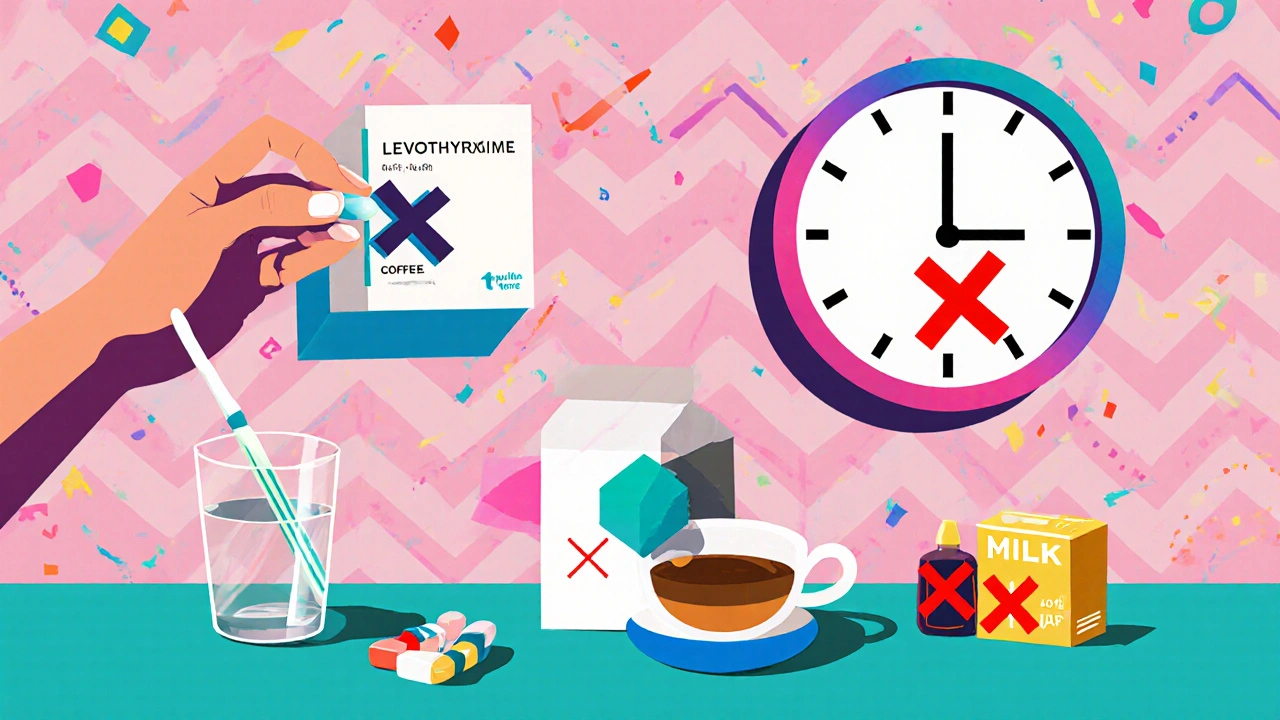
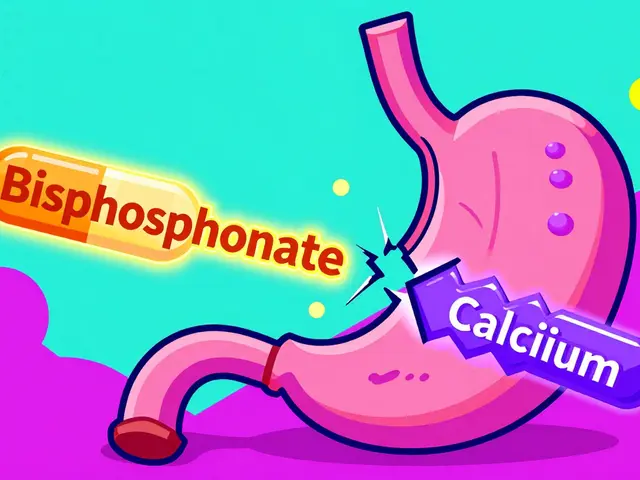
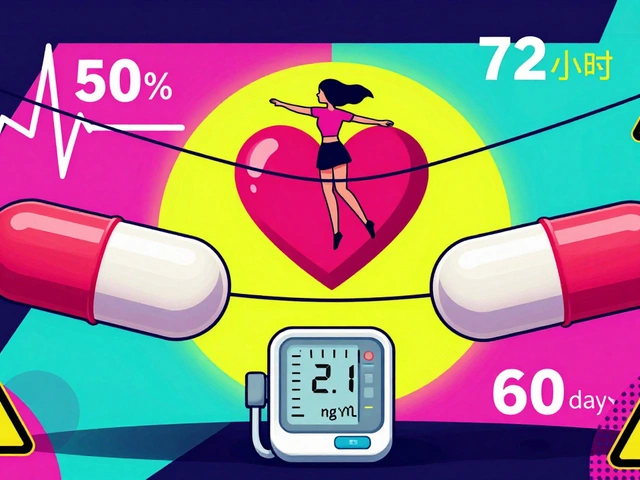
November 18, 2025 AT 00:39 AM
I switched to nighttime dosing last year after years of struggling with morning coffee and breakfast. My TSH dropped from 3.9 to 1.1 and I finally stopped feeling like a zombie. No more midday naps, no more brain fog. I wish I’d known this sooner.
November 19, 2025 AT 16:30 PM
Man, I used to take mine with my morning smoothie like a champ… until I started getting heart palpitations. Turned out my iron supplement was wrecking my absorption. Now I take it at 5 a.m. with water, then go back to bed. Best decision I ever made. My energy’s back, and I don’t hate Mondays anymore. 🙌
November 20, 2025 AT 10:36 AM
So you’re telling me my 10 years of ‘I don’t have time to wait 30 minutes’ was just me being lazy and my thyroid was screaming the whole time? 😅
November 20, 2025 AT 11:45 AM
For years I thought my fatigue was just ‘aging’ or ‘stress.’ Turns out my TSH was hovering at 5.2 because I took my pill with yogurt and a banana. I switched to bedtime dosing after dinner - no snacks after, just water - and within six weeks, I felt like my 30-year-old self again. It’s not magic. It’s biology. And it works if you let it.
Don’t underestimate how much your body craves consistency. It’s not about being perfect. It’s about showing up the same way every day. Your thyroid isn’t judging you. It’s just waiting for you to give it what it needs.
If you’re still struggling, talk to your doctor about Tirosint-SOL. Yeah, it’s pricey, but if your life is falling apart because of absorption issues, it’s worth every penny. You deserve to feel good.
November 22, 2025 AT 10:15 AM
Interesting that the 2020 systematic review showed improved free T4 levels with nocturnal dosing. From a pharmacokinetic standpoint, gastric emptying time and intestinal motility are significantly modulated by circadian rhythm - particularly the migrating motor complex (MMC), which peaks during fasting states in the overnight period. This likely enhances levothyroxine dissolution and jejunal uptake. The data aligns with chronopharmacology principles.
That said, compliance remains a confounder. Many patients misinterpret ‘3-4 hours after last meal’ as ‘after dinner,’ which often includes high-fat or high-fiber components that still interfere. A prospective, randomized crossover study with serum T4 monitoring at 2h, 4h, and 8h post-dose would clarify this further.
November 22, 2025 AT 23:31 PM
Thank you for writing this. I’ve been taking mine with coffee for 5 years and thought I was fine because I didn’t feel ‘sick.’ But I was always tired. Now I take it at 6 a.m., wait an hour, then drink my coffee. I’ve got my life back. You’re not crazy for needing structure - your body just needs respect.
November 24, 2025 AT 11:54 AM
THIS IS A SCAM. 😡 I’ve been taking my pill with my protein shake since 2018 and I’m fine. My doctor even said ‘it’s fine if you feel good.’ Why are you people so obsessed with rules? My thyroid doesn’t care about your studies. I feel great. End of story. 🤷♂️
November 25, 2025 AT 02:13 AM
Oh please. ‘Tirosint-SOL’? That’s just a marketing ploy by a pharmaceutical company to upsell a $400/month drug. If you can’t follow basic instructions like ‘take it on an empty stomach,’ maybe you shouldn’t be managing your own hormone therapy. This isn’t a parenting blog - it’s endocrinology.
November 26, 2025 AT 01:45 AM
Wow. So the entire thyroid community is just… wrong? Everyone who takes it with food is just delusional? I’ve been doing it for 12 years. I’ve got a PhD. I read the studies. I know what I’m doing. You’re all just panicking because you can’t handle a little flexibility.
November 26, 2025 AT 16:53 PM
Wait… what if the FDA is hiding the truth? What if coffee doesn’t interfere at all and it’s all about glyphosate in the water? I read a blog post that said the thyroid industry is controlled by Big Pharma and they want you to believe you need to wait 60 minutes so you’ll buy more pills. I’ve been taking mine with coffee and organic kale and I’m healthier than ever. 🌱💊
November 27, 2025 AT 17:01 PM
So… you’re saying I’ve been poisoning myself for 8 years? 😭
November 28, 2025 AT 04:09 AM
My cousin’s endocrinologist told her to take it with orange juice because ‘it helps absorption.’ She’s been in the hospital 3 times. I swear, doctors don’t know anything anymore. I’m starting my own thyroid group on Telegram. We’re going to expose the truth. 🚨
November 29, 2025 AT 05:52 AM
Look, I get it. You all want to feel like you’ve cracked the code. But here’s the reality: most people don’t need to be this obsessive. Your TSH is a guideline, not a god. I’ve had mine at 5.0 for years. I’m functional. I run marathons. You’re all so busy following rules that you’ve forgotten to live. Maybe the real problem isn’t your timing - it’s your anxiety.